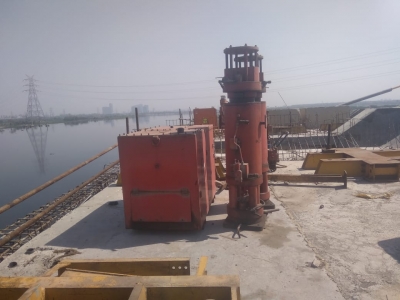New Delhi, March 3 : Commuters waiting for the signal-free ride from Delhi’s East to South will have to wait for another one-and-a-half year as the under-construction Barapullah Phase-3 elevated corridor project, connecting Mayur Vihar-1 to Sarai Kale Khan, is still facing the land acquisition hurdle.
The Public Works Department (PWD), which is carrying out the construction work through an agency, missed its three deadlines in 2017, 2018 and 2020.
Delay in acquiring the land portion along the Yamuna floodplain forced the PWD-hired private construction firm to stop the work midway.
Now, the hired agency, though has started the project work at Sarai Kale Khan, estimated that the work will be completed in the next one-and-a-half year if the land acquisition obstacle is resolved.
However, the PWD is yet to set any deadline for the project.
Speaking to the IANS, the office of PWD Minister of Delhi government said, “The government has succeeded in acquiring lands from the individual landowners at Yamuna floodplain in some parts and the process for the acquisition of the remaining part of land is underway.”
As per the sources, the PWD needed to acquire two plots measuring 500m and 250m to erect pillars for the fully elevated corridor, of which 180m has been acquired and the remaining around 670m is yet to be acquired.
The process of land question was initially started by the Delhi government in 2015 after the phase 3 of Barahpullah flyover was started.
Sources said that landowners were ready to sell their land, but the legalities under the Land Acquisition Rehabilitation and Resettlement Act 2013 had put a spanner in the works.
Sources in PWD said, as per the rules, before acquiring private land, a Social Impact Assessment (SIA) of the land has to be done.
Sources also confirmed though, the process was started two years back, however, both the parties (Delhi government and individual landowners) are yet to reach any final agreement.
The phase 3 of Barapullah project which is fully elevated corridor from Mayur Vihar 1 to Sarai Kale Khan comprises of around 270 pillars along the way.
An official authorised for monitoring the project told IANS that the hired agency has started reconstruction the well located in the middle of the Yamuna River.
“The well which was dug for setting pillars was collapsed due to heavy rain fall last year.The agency had then demanded for Rs 2 crore from PWD for it, however, parties (PWD and hired agency) could not finalised the matter and as result the agency had stopped construction work.Now, both parties have reached an agreement; the agency has started redeveloping the well.
But, hindrance is not over as the land is yet getting acquired,” the official said on the condition of anonymity.
When asked as to when the bridge between Sarai Kale Khan and Mayur Vihar 1 will be connected, he said.
“Delay has not occurred from the agency side but from the government side.
Around 180m part of land was acquired in Mayur Vihar 1 side and pillars have been constructed,” he added.
It is expected that phase 3 of the Barapullah corridor will give a signal-free stretch to commuters moving from East to South Delhi, who will be able to make the journey in just 20 minutes.
The Barapullah elevated corridor was planned in three phases.
The first phase was constructed in 2010 during the Commonwealth Games, connecting Sarai Kale Khan and Jawaharlal Nehru Stadium.The second phase, which is also under construction, connects the stadium to INA market, while Phase 3 will connect Mayur Vihar Phase I to Sarai Kale Khan.
According to the PWD sources, the project, which was initially supposed to be completed by October, 2017 missed its several deadlines.
The repeated delay in project has risen to its estimated cost of 1,288.93 crore against its earlier estimated cost of Rs 1,000 crore.
The only respite for the project had been in early 2019 when an 800-metre flyover, another crucial component of the project providing signal-free passage from near the vicinity of Mayur Vihar extension to the Akshardham metro station was thrown open and has reduced travel time between both points to between 15 to 20 minutes
.






